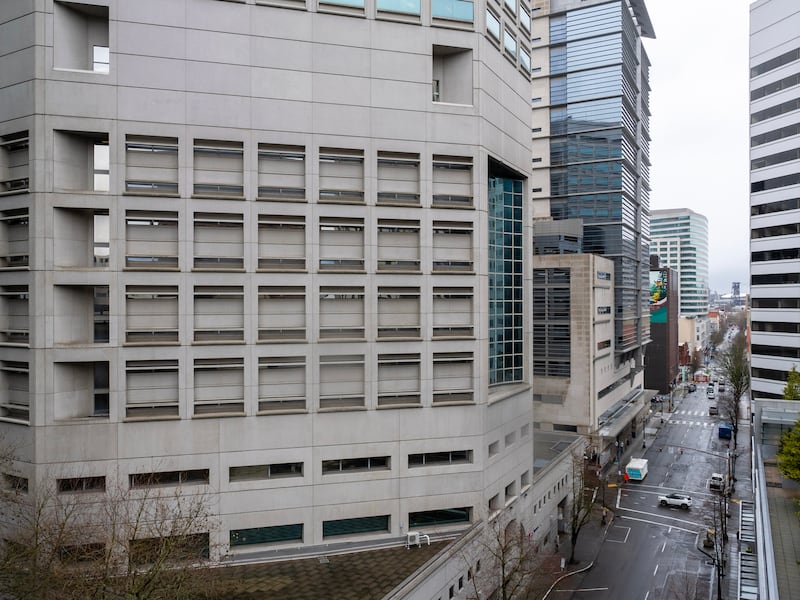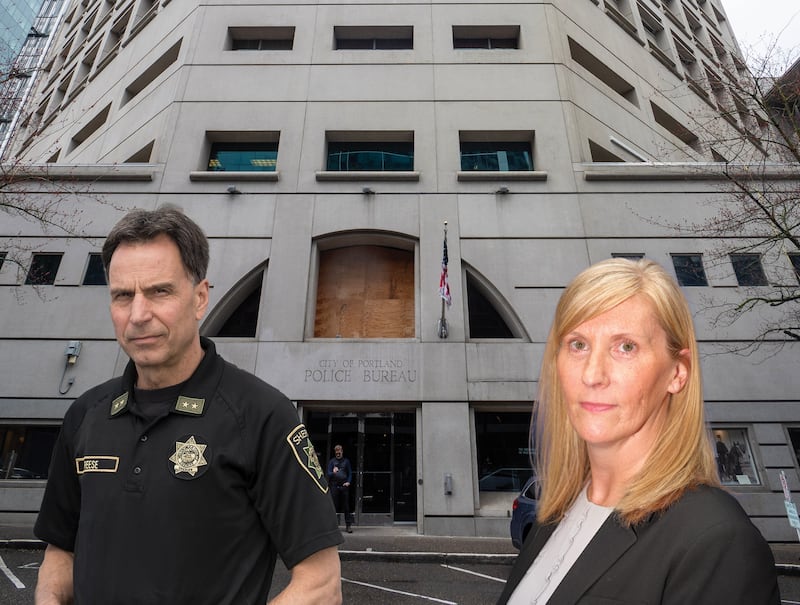When Brandon Ledesma, 39, was brought to Multnomah County’s downtown jail on an autumn morning in 2019, he knew the drill. Addicted to heroin and stealing to obtain it, he’d been booked, by his own estimate, dozens of times before.
He sat down in one of the gray vinyl chairs in the jail’s intake room, put his feet up on the seat next to him, and tried to sleep off the high.
The two deputies overseeing booking weren’t pleased, he now says. One walked over and removed Ledesma’s feet. They jawed a bit. Ledesma called him a “punk” and then tried to go back to sleep.
At 11 pm, two deputies woke him and escorted him to a cellblock on the fifth floor. When they arrived, he says, one deputy, Gustavo Valdovinos, told the deputy on duty to “take a break” and shepherded Ledesma across the cellblock.
Deputy Valdovinos unlocked a cell and ushered Ledesma in. Then, as Ledesma stepped inside, he was attacked from behind.
First, a sharp punch to the ribs. He fell to the floor. “I just started getting stomped on,” he remembers, although he couldn’t see who did it. The beating lasted less than a minute.
Dopesick and exhausted, Ledesma tried to sleep. Two hours later, according to a state report released last month, he was transported across the Willamette River to Inverness Jail, where the booking deputy made note of “black and blue marks” on Ledesma’s face. A nurse noticed one of his fingers was broken.
Questions were asked about how Ledesma was assaulted—and whether his guards played a role.
At the time, Valdovinos was asked about the beating, but said he didn’t remember the incident. There were no cameras on the floor.
For more than four years, Ledesma had no idea who assaulted him—until last month, when the Multnomah County Sheriff’s Office published a 142-page report outlining allegations that the assault of Ledesma was part of a larger problem: It was likely carried out by members of a violent gang that guards had allowed to effectively run several units on the fifth floor of the downtown jail from 2018 to 2020.
The investigation, conducted by the Oregon State Police, reviewed more than a dozen assaults, including the attack on Ledesma, documented in the jail over a period of three years. While the state investigator found corroborating evidence for many of the allegations, prosecutors declined to pursue criminal charges. On Feb. 20, Sheriff Nicole Morrisey O’Donnell announced she would bring in outside investigators to determine how to discipline the deputies.
What more than a dozen of inmates and deputies described to state investigators went well beyond an isolated attack. Instead, they said, jail guards colluded from 2018 to 2020 with members of the Hoover Criminals, one of the most violent street gangs to emerge from Los Angeles.
“Hoovers were running the units,” an inmate told investigators, according to a description of the interview included in the report. “The cops were doing what the inmates say.”

WW first reported nearly 18 months ago that the state police were investigating three Multnomah County corrections deputies, but could offer few details then. The sheriff’s office gave no explanation for the investigation, but WW pursued the matter via a public records request based on a tip that deputies had been running a “fight club” inside the downtown jail, which is located below Portland Police Bureau headquarters on Southwest 2nd Avenue and holds around 350 inmates.
In county jails like this one, some inmates are held for only a few days until they can see a judge, but many stay months or even years while they await trial or serve short sentences. Those convicted of longer sentences are transferred to state prisons.
When the Oregon State Police report was finally released Feb. 20, the findings were different from the tip WW received but equally troubling. In interviews, inmates said the L.A.-based Hoover Criminals, one of Portland’s most violent gangs, were “running” units in the jail, and often doing so with the cooperation of guards.
Investigators caught one gang member, Jordan “Cash” Million, on tape admitting to assaulting Ledesma. He described his relationship with deputies on a recorded line: “We take care of shit for them, they gonna take care of shit for us in here.”
Gangs in American correctional institutions are an ugly but common presence. Texas prison gangs traffic drugs and contract murders. In Los Angeles County jails, deputies themselves formed violent gangs that operated in the jails for decades.
But what’s different in this case is that deputies are accused of aligning themselves with an existing criminal street gang.
John Sweeney, a Los Angeles lawyer who helped expose the deputy gangs in California, says the allegations that Portland deputies had allied themselves with a street gang are unlike anything he’s heard of happening in L.A.—or anywhere else. “I don’t know anywhere in the country where that is going on,” he says.
David Pyrooz, a professor of sociology at the University of Colorado Boulder who’s done research in Oregon prisons, says he’s heard of similar allegations in places like Alabama or Georgia. “There’s a lot of correctional officers who engage in bad behavior,” he explains.
Still, investigators’ findings in Oregon are “eye opening,” he says. “How could this have gone on for so many years without it coming to light?”
Adds Pyrooz, “It makes you wonder about what oversight was taking place.”
Indeed, the report released Feb. 20 raises many questions about who knew what was occurring on the jail’s fifth floor.
Sheriff Nicole Morrisey O’Donnell, who took office last year, long after any of the alleged behavior occurred, called it “egregious and unacceptable.” Her spokesman says she first read the Oregon State Police report shortly after WW obtained it Feb. 12.
The Multnomah County sheriff during that period was Mike Reese, a career cop and former Portland police chief who is now head of the Oregon Department of Corrections, appointed by Gov. Tina Kotek on Oct. 24.
He called the deputies’ behavior “reprehensible,” saying in a statement he didn’t know about it until the FBI informed him of the gang members’ allegations in early 2022.
Experts tell WW it is rare for allegations like this to see the light of day. Jails operate with little public scrutiny, and the complaints of inmates, who have been accused or convicted of crimes, are easily dismissed.
To be sure, there are reasons to doubt some of the allegations. Some of the state’s key witnesses to the misconduct were themselves gang members on trial for violent crimes who ratted out their captors in hopes of receiving lighter sentences. At least one of the witnesses had already been caught lying, both to investigators and under oath at trial.
Still, the investigative report contains not just the accounts of cooperating gang members, but of other inmates—and even fellow deputies. These witnesses who spoke to state investigators were unaffiliated with the gang and appalled by what they said was happening inside Portland’s downtown jail: deputies encouraging brutal jailhouse fights.

Los Angeles street gangs began moving up to Portland in the 1980s as they searched for new markets in which to sell crack. The biggest gangs were the Bloods and the Crips. Smaller, local “sets” often allied themselves with one side or the other in their battles for territory.
The Hoover Criminals arrived then, too—and made enemies with both sides. First with the Crips, after the Hoovers accused their members of cheating at a dog fight. Then with the Bloods, after a young Hoover named Xavier Bolden killed one of their members at a Portland nightclub in November 2013.
By 2019, the Hoovers had taken to calling themselves the “everybody killers” and they’d earned a reputation for indiscriminate violence.
While the Bloods wore red and the Crips wore blue, the Hoovers preferred orange. Like many street gangs, their organization was hierarchical, and to move up and become an “OG,” members were expected to prove their worth through violence. They’d traffic drugs, pimp and rob.
It’s hard to say how many people have joined the Hoovers in Portland over the past decade. Tracking their numbers became more difficult in 2017 after the city, under pressure to eliminate racial disparities in policing, ceased keeping a list.
But a series of high-profile murders got the attention of federal officials. In 2017, three Hoovers fired guns into the bedroom of a rival gang member, hitting a 9-year-old boy in the head while he slept. In response, the U.S. Department of Justice launched an ambitious effort to eliminate the gang entirely.
Their efforts culminated in a sprawling racketeering indictment filed in federal court in Portland. The defendants were held in the Multnomah County jail, sometimes for years, as prosecutors built their case.
Many of the Hoovers ended up in two housing units on the fifth floor: 5A and 5D, which house 32 inmates each. Deputies said the units were notoriously difficult places to work. During this period, witnesses named at least 10 Hoovers housed in these units. There were so many gang members in the downtown lockup that it gained a new nickname: “Hoover Jail.”
Most deputies, who “bid” for desirable shifts by seniority, tended to avoid the units entirely. Among those who volunteered, some garnered reputations for how they “handled” problematic inmates. “It was a complete shitshow,” Deputy Jorge Troudt, who worked the unit in 2019, would later tell the state police investigator.
In the OSP report, Troudt called out two deputies, Gustavo Valdovinos and Mirzet Sacirovic, who were “at the top of the list” of deputies who were known to fight inmates, he told the investigator, who later noted it in her report. Both men frequently volunteered to staff the fifth-floor units, prosecutors say.
The pair were recent hires and former star college athletes. Valdovinos was a college linebacker from California, now a gym rat living in Vancouver, Wash., who can bench press upwards of 400 pounds. He joined the sheriff’s office in 2017.
Sacirovic was born in the Balkans and arrived in Portland as a child, where he attended Marshall High School and later Concordia University. He was trilingual and a star soccer player—he tried out for the Portland Timbers upon graduating and later became a corrections officer at the Multnomah County Sheriff’s Office a year after Valdovinos.
Sacirovic and Valdovinos often worked together and they became friends. They’d hang out after work, Sacirovic later said to an investigator. He attended Valdovinos’ daughters’ birthday parties.
According to one former co-worker, Les Soloai, Sacirovic had long been intrigued by the gang lifestyle and “got mixed up with the Hoover gang specifically.” Soloai says Sacirovic told him that he’d known some Hoovers members prior to coming to work at the sheriff’s office.
An OSP investigator tracked down Soloai to Utah, where he now lives. In her report, she summarized what Soloai told her about Sacirovic: “[He] developed friendships with the inmates and would allow them to handle their own beef the way they would on the street.”

Units 5A and 5D sit across the hall from each other on the fifth floor of the Multnomah County Detention Center. In each, 32 inmates are housed, one per cell, stacked on top of each other in two tiers.
There’s a common area with telephones and card tables. But inmates spend much of their time in their cells. At night, and during periodic “lockdowns,” the cell doors were locked.
Some inmates, however, were given special privileges. “Orderlies,” or inmate workers, were given additional walk time in the evenings. And on those units during that time, Deputy Troudt told investigators, most of the orderlies were Hoovers.
The three Hoover gang members told investigators they were given preferential treatment, and that deputies would bring in contraband, like razors or cannabis, or pass illicit drugs at their request.
Among the things the Hoovers were accused of doing by people interviewed by police was orchestrating fights to beat up rivals. They just needed a deputy to pop open a cell door of their target.
Investigators documented 14 assaults in 2018 and 2019 in which witnesses claimed deputies had popped doors, tacitly approved, or otherwise assisted the attacks.
Sometimes, investigators found, the victims were rival gang members. Other times, they were inmates who had annoyed the guards.
The fights mostly happened when Sacirovic or Valdovinos were working, gang members told investigators. One said they would plan assaults around Valdovinos’ shift schedule, which the deputy had marked on a calendar in the unit.
Sometimes the two deputies allegedly did the fighting themselves.
“If they were gang members, they were letting us handle it,” a Hoover said to state investigators. “When they had problems with certain inmates that weren’t gang members, they would just go in the cell and beat ‘em up by themselves.”

The Oregon State Police report details a series of assaults on inmates by both deputies and gang members.
Back in May 2019, Joseph Badley was homeless when he was arrested and jailed downtown for punching a bus driver. He had the misfortune to be booked in Unit 5A, where he was singled out by Valdovinos after calling the deputy a “dickhead,” according to a 2020 jail complaint.
Two years later, he told his story again to an OSP investigator. The night after Badley’s confrontation with Valdovinos, he said, he heard the door pop and Valdovinos and Sacirovic entered his cell. Valdovinos kicked him in the face, he claimed, and Sacirovic punched him in the ribs. It would take him months to recover from the injuries to his lungs.
But his guards’ demeanor changed, Badley says, upon learning Badley had a connection to the Hoovers.
Badley told investigators that word got out he was the brother of Xavier Bolden, a prominent Hoover who had started the Portland gang’s war with the Bloods and is currently serving a life sentence in Oregon State Penitentiary.
A deputy found out and came to his cell to apologize, Badley says. They hugged. “If I had known you were a Hoover, that would have never happened,” Badley recalled a deputy saying, according to a jail sergeant’s account of a complaint he made in February 2020.
But his story had a problem: Badley recalled a different deputy making the apology in a later interview with investigators. Valdovinos, in his response to the 2020 complaint, said Badley was a known liar and “no stranger to disciplinary actions.”
Other witnesses were more reliable.
On Sept. 6, 2019, a different jail deputy was doing rounds when she heard scuffling in a neighboring cell. She ran over to see two men beating up the cell’s occupant. Reaching for her radio, she realized one of the men was Sacirovic.
He laughed it off, she later told investigators.
At the time, she didn’t report the incident. “I was too scared to say anything,” she would later say. “I didn’t think anybody was gonna take me seriously.”
When interviewed by detectives, Sacirovic denied knowing anything about deputies popping cell doors—but acknowledged that he couldn’t remember everything that happened on the unit. “To my knowledge, I’ve never opened anybody’s door and sent somebody in there or anything like that,” he said.
And while the National Institute of Corrections recommended back in 2016 that Multnomah County put cameras in the jail, they weren’t installed on the 5th floor units until November 2020.
The assaults stopped shortly before the cameras were installed. One deputy told investigators he believed the cameras caused deputies to change their behavior.

Five years after a gang allegedly took over a pair of units in the Multnomah County jail, it’s not clear who will be held accountable.
Prosecutors have declined to pursue charges against the three deputies under suspicion of misconduct: Valdovinos, Sacirovic and Troudt. Both Sacirovic and Troudt have denied misconduct in interviews with investigators. Valdovinos declined to be interviewed by police without a lawyer. (“There should not be a rush to judgment,” their union said in a statement.)
Sheriff Morrisey O’Donnell has brought in another outside investigator to conduct a disciplinary investigation.
She released a statement but would not agree to an interview.
The sheriff at the time isn’t talking either. Mike Reese, from his new office at Department of Corrections headquarters in Salem, released a statement highlighting his efforts to increase oversight of the county’s jails but declined WW’s request for a sit-down.
Robert Clark, a retired lieutenant in the Los Angeles County jails who’s testified as an expert witness in cases of jail misconduct, says higher-ups must have had an inkling of what was happening on the unit.
“There’s no way you can do anything without it being known in the locker room,” he says. “Of course you knew what was going on.”
And what of Brandon Ledesma, the inmate assaulted in his cell that night in 2019? He says he’s avoided the jail since, finally getting clean last year and being reunited with his 10-year-old daughter.
He had no idea who attacked him until he read news of the investigation last month. When interviewed by WW, he was astounded that the deputies wouldn’t face criminal charges.
“I don’t understand how there’s not enough evidence,” he said. “They’re criminals too.”


